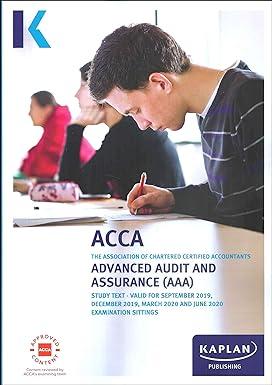Question
9. Which report lists taxable and non-taxable sales separated by sales tax item grouped by vendor? A. Sales Tax Payable Summary B. Sales Tax Revenue
9. Which report lists taxable and non-taxable sales separated by sales tax item grouped by vendor? A. Sales Tax Payable Summary B. Sales Tax Revenue Summary C. Sales Tax Payable by Vendor D. Sales Tax Payable by Customer
10. Your client has a customer who is also a vendor. They want to offset what they owe the vendor against what the customer owes them. According to the method detailed in the Guide, what is the first step in this process? A. Make the customer and vendor inactive. B. Create a new customer named CPA Use Only. C. Create an income account called Trade-Off Income. D. Create a bank account called Barter Clearing Account.
11. There are two methods of tracking vendor deposits described in the Supplemental Guide training. What is the primary difference between them? A. One method works for sales tax purposes, whereas the other method does not. B. The first method shows the deposit as a credit in the vendor's account. The second method shows the deposit as an asset. C. One method requires a year-end journal entry to adjust the vendor deposits. The other method requires a journal entry every month. D. The first method assumes the client is using the cash basis of accounting. The second method assumes the use of the accrual basis.
12. Which statement is true concerning how QuickBooks Desktop Pro and QuickBooks Desktop Premier calculate the value of inventory? A. QuickBooks Desktop supports the average cost method. B. QuickBooks Desktop supports FIFO, LIFO, and average cost. C. Once a method has been chosen it cannot be changed. D. QuickBooks Desktop supports the use of different costing methods with different items.
13. What is the purpose of the Total Value in the Adjust Quantity/Value window? A. Assigns cost codes to inventory. B. Allows you to correct the on-hand quantity of an inventory item. C. Lets you adjust inventory to track the components used in manufacturing. D. Lets you enter a new value for an inventory item to correct errors or record a loss
14. Which of the following describes a transaction that you would enter in the Enter Credit Card Charges window? A. Charges to the checking account B. Credit card purchase from a vendor C. Credit card refunds back to customer D. Merchant Service processing fees
15. What does the Beginning Balance in the Begin Reconciliation window represent? A. The sum of all previously reconciled transactions in the account. B. It always represents the ending balance on last month's bank statement. C. The beginning balance for the account entered when QuickBooks was set up. D. An internal calculation made by QuickBooks that is not relevant to the reconciliation process.
Step by Step Solution
There are 3 Steps involved in it
Step: 1

Get Instant Access to Expert-Tailored Solutions
See step-by-step solutions with expert insights and AI powered tools for academic success
Step: 2

Step: 3

Ace Your Homework with AI
Get the answers you need in no time with our AI-driven, step-by-step assistance
Get Started


